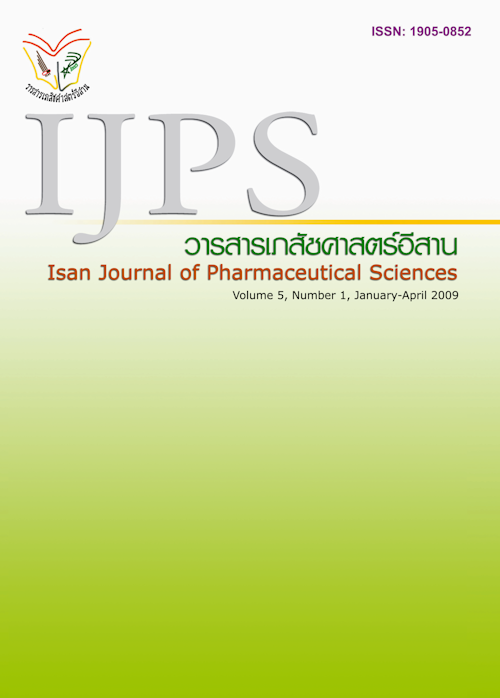Monitoring Knowledge, Health-behavior and Clinical Outcomes of Population with Risk Factors for Type 2 Diabetes
Main Article Content
Abstract
This study is one group pretest-posttest experimental design. The purposes of this study were to compare the level of fasting blood sugar, knowledge, and behavior between before and after receiving two month counseling in people at high risk group for type II diabetes mellitus. One-hundred and forty-five people who had high risk for type II diabetes mellitus at Nongmuang village were included in the study. This study was conducted between January 1 and February 28, 2008. McNemar test and paired t-test were used for analysis. The prevalence of population with diabetes risk factor is 24.1%. The results revealed that level of fasting blood sugar and blood pressure were significantly decreased after receiving counseling (p < 0.05). However, body mass index, and waist circumference were not significantly different after counseling. Significantly lower frequency of carbohydrate consumption, lipid consumption, stress and higher frequency of exercise were found after counseling (p < 0.05), also for alcohol drinking and frequency of smoking were decrease. There were no significant differences in sleeping behavior when comparing between pre and post counseling. In conclusion, the two month counseling program is beneficial for people at high risk group for type 2 diabetes.
Article Details
In the case that some parts are used by others The author must Confirm that obtaining permission to use some of the original authors. And must attach evidence That the permission has been included
References
American Diabetes Association. Standard of medicalcare in diabetes. Diabetes Care 2009; 26(Suppl 1): S4-41.
Gillies CL, Abrams KR, Lambert PC, et al. Pharmacological and lifestyle interventions to prevent or delay type 2 diabetes in people with impaired glucose tolerance: systematic review and meta-analysis. BMJ 2007; 334: p.299.
Jiamjarasrangsi W. Prevalence and estimated incidence of type 2 diabetes among working population in Bangkok: A preliminary report. Chula Med J 2005; 49(2): p.73-81.
Laatikainen T, Dunbar JA, Chapman A. Prevention of type 2 diabetes by lifestyle intervention in an Australian primary health care setting: Greater Green Triangle (GGT) Diabetes Prevention Project. BMC Public Health 2007; 7: p.249.
Tuomilehto J, Lindstrom J, Eriksson JG, et al. Prevention of type 2 diabetes mellitus by changes in lifestyle among subjects with impaired glucose tolerance. N Eng J Med2001; 344: p.1343-1350.
The Diabetes Prevention Program Research Group. The diabetes prevention program. Diabetes Care 2001; 23: p.1619-1629.


